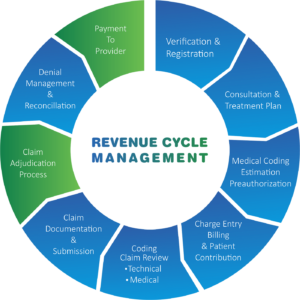In the ever-evolving landscape of healthcare, where patient care takes precedence, the effective management of financial processes is essential for the sustainability and success of healthcare providers. Revenue Cycle Management (RCM) stands at the forefront of this financial strategy, playing a pivotal role in optimizing revenue streams and ensuring the fiscal well-being of healthcare organizations.
Understanding Revenue Cycle Management:
Revenue Cycle Management is a comprehensive approach that encompasses the entire life cycle of a patient account, from appointment scheduling to the final payment received. The primary goal is to streamline and optimize the financial processes associated with patient care, from capturing charges to reimbursement, in order to maximize revenue and minimize financial risks.
Key Components of Revenue Cycle Management:
Patient Registration and Eligibility Verification:
The RCM process begins with accurate patient registration and thorough eligibility verification. Ensuring that patient information is correct and verifying insurance coverage helps prevent billing errors later in the cycle.Charge Capture:
Accurate charge capture involves documenting all billable services and procedures performed during a patient’s visit. This step ensures that healthcare providers are appropriately compensated for the care they provide.Coding and Documentation:
Medical coding is a crucial aspect of RCM, as it involves translating healthcare services into standardized codes. Accurate coding is essential for claim submission and reimbursement, and it helps prevent denials due to coding errors.Claim Submission and Follow-up:
Efficient submission of claims to insurance companies and timely follow-up on unpaid or denied claims are key components of RCM. This ensures that healthcare providers receive reimbursements in a timely manner and reduces the risk of revenue leakage.Payment Posting and Reconciliation:
RCM involves accurately posting payments received and reconciling accounts to track revenue. This step helps identify discrepancies, ensures proper accounting, and provides insights into the financial health of the organization.Denial Management:
Addressing claim denials promptly is crucial for optimizing revenue. RCM services include robust denial management processes that analyze the reasons for denials, implement corrective actions, and reduce the likelihood of future denials.
Benefits of Revenue Cycle Management:
Optimized Revenue Streams:
RCM services contribute to optimizing revenue by reducing billing errors, minimizing denials, and ensuring timely reimbursements.Improved Cash Flow:
Timely submission of claims and efficient follow-up processes lead to faster payments, enhancing the overall cash flow of healthcare organizations.Enhanced Operational Efficiency:
By streamlining financial processes, RCM services improve operational efficiency, allowing healthcare providers to focus on delivering high-quality patient care.Compliance Adherence:
RCM services help healthcare organizations stay compliant with ever-changing regulations and industry standards, reducing the risk of non-compliance penalties.Financial Visibility:
Through effective reconciliation and reporting, RCM provides healthcare organizations with a clear and comprehensive view of their financial performance, enabling informed decision-making.
Conclusion:
As healthcare continues to evolve, Revenue Cycle Management remains a cornerstone for financial success. Providers, such as Supra Mediinformatics, navigate the complexities of RCM, ensuring accuracy, efficiency, and compliance. By embracing the principles of RCM, healthcare organizations can confidently navigate the financial landscape, secure in the knowledge that their revenue processes are optimized for long-term success in the ever-dynamic healthcare industry.



